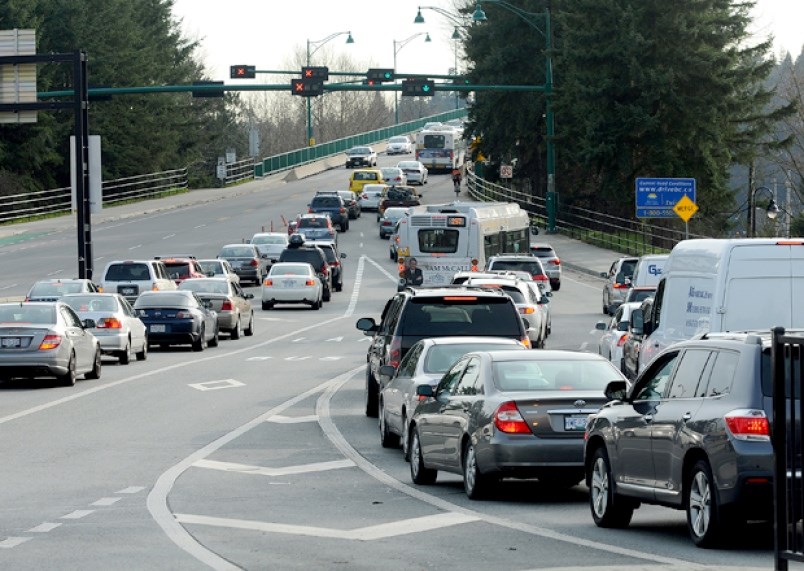The North Shore’s three municipalities are getting on the same page on transportation issues, at least at the staff level.
City of North Vancouver, District of West Vancouver and District of North Vancouver councils all endorsed a plan Monday night to form a North Shore municipal transportation committee.
Under the committee’s terms of reference, top transportation, engineering and planning staff from each local government will meet at least four times a year to co-ordinate on local priorities, consult with and advocate to senior levels of government and outside agencies like TransLink and report back to their respective councils.
Some of the suggested priorities brought up by West Vancouver director of engineer and transportation Ray Fung in his presentation to council included: considering a single North Shore transit operator, exploring the possibility of a joint bus depot, lobbying for a B-line bus from Maplewood to Dundarave, completion of the Spirit Trail, improvements to Highway 1’s interchanges and better traffic management at provincially controlled intersections like Taylor Way and Marine Drive.
“I believe that the municipal voice is stronger when advocating to senior governments if we work together rather than separately,” Fung said. “Even between neighbouring jurisdictions, say between West Van and North Van, there would be better co-ordination of our own actions or individual municipal actions if we met together more formally.”
Not on that list is a third crossing over (or under) Burrard Inlet, unless it is for transit, not personal vehicles.
“The fact is, the City of Vancouver is not supportive of more vehicles entering their downtown core,” Fung said.
Although enthusiasm for the plan ranged from warm to highly skeptical, the idea received unanimous support from all 21 elected council members in the three municipal halls.
“I think it’s a long time coming,” said Coun Lisa Muri at DNV council. “It would be nice if we had a committee to look at these things, especially at the pace that we’re changing and the with challenges that we’re facing, and, certainly in the last five years, we’re facing great trouble in movement across the North Shore. I fully support this. I think the community will fully support this.”
Others, however, showed concern about the lack of political or public representation on the committee.
“I’m just concerned that there won’t be enough opportunity for the political bodies who are ultimately going to have to advocate … to steer, have input, keep apprised of the activities of this committee,” said West Vancouver Coun. Mary-Ann Booth. “We also hear from our residents a lot about problems but they also come up with some pretty good solutions. Where is that link? Where is that opportunity?”
District of North Vancouver Coun. Roger Bassam pointed out the three municipalities often don’t share the same goals. And if the North Shore wants to speak with one voice, it should be pursuing amalgamation, he added.
“I know historically we haven’t done a good job of sharing information so I certainly see this as a good opportunity to better share information, certainly at a staff level, but ultimately we’re going to need one political decision-making group ... for the North Shore. I’m always a little wary that these committees are offered up as a substitute towards a unified political voice for a community,” he said.
West Vancouver Couns. Craig Cameron too suggested the transportation committee might be a “half-measure.”
“The mayor might strangle me for this but I think we also need to be discussing larger planning issues …. with the other North Shore municipalities because there’s no sense in us making planning decisions in isolation and the District (of North Vancouver) doing the opposite,” he said.
At North Vancouver City council, Mayor Darrell Mussatto said, while there are “a lot of commonalities” throughout the North Shore, the city has made it clear its top three clear priorities: public transit, walking and cycling.
City Coun. Linda Buchanan noted the worsening congestion is thanks in large part to North Shore workers who can’t afford the cost of housing here and must commute.
“It becomes our problem because it’s impacting our local roads which then impacts our economy,” she said.



